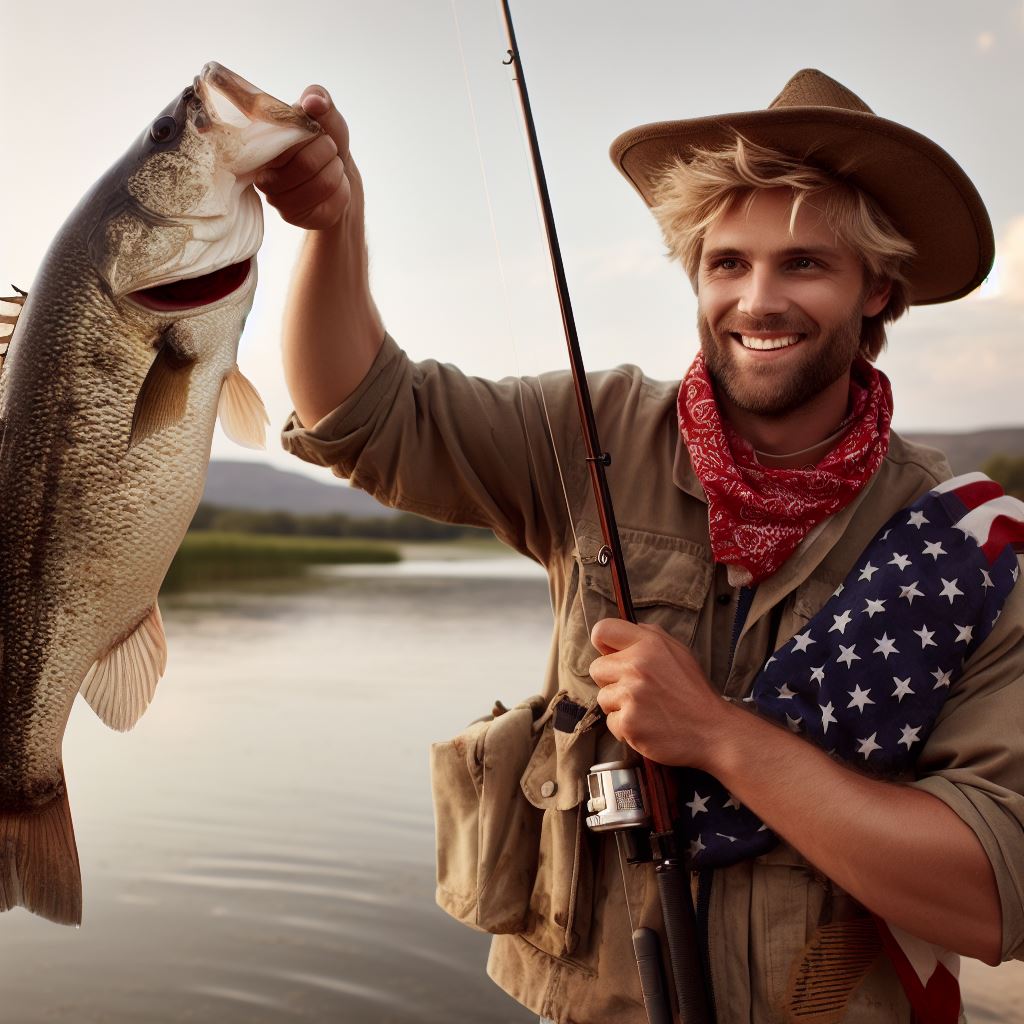Introduction
The fishing industry has a long history in America, contributing to its economy.
Picture this a serene scene by the lake, fishing rods in hand, anticipation in the air.
In the rhythmic dance between man and sea, fishing has long played a pivotal role in shaping America’s economic landscape.
From the bustling harbors of New England to the serene shores of the Pacific Northwest, the economic impact of fishing reverberates through the nation’s financial currents.
This blog aims to cast a spotlight on the intricate web of economic connections woven by the fishing industry, exploring its far-reaching implications on jobs, commerce, and regional development.
As trawlers set sail and anglers cast their lines, the economic ripple effect extends beyond the water’s edge, intertwining with sectors as diverse as tourism, manufacturing, and international trade.
Join us as we dive into the depths of this vital industry, examining the dollars and cents beneath the surface and discovering the economic tides that ebb and flow with each catch.
Welcome aboard as we navigate the economic seascape of fishing in America.
Importance of the fishing industry in America
Overview of the economic impact
Fishing industry in America plays a vital role in the country’s economy.
It contributes significantly to the Gross Domestic Product (GDP) of the nation.
The economic impact of fishing includes various sectors like commercial fishing, recreational fishing, and aquaculture.
Commercial fishing involves the catching and selling of fish for consumption or other purposes.
Recreational fishing, on the other hand, involves individuals or groups engaging in fishing as a leisure activity.
Aquaculture involves the controlled breeding and cultivation of aquatic plants and animals.
This multi-faceted fishing industry aids in sustaining economic growth and development.
Contribution to employment
The fishing industry provides employment opportunities for a significant number of Americans.
Various sectors within the industry create jobs, both directly and indirectly.
Commercial fishing alone employs thousands of fishermen, fish processors, and seafood vendors.
The recreational fishing sector also supports jobs in charter fishing, fishing equipment manufacturing, and tourism.
Aquaculture contributes to employment through fish farm workers and technicians.
Transform Your Career Today
Unlock a personalized career strategy that drives real results. Get tailored advice and a roadmap designed just for you.
Start NowThese jobs offer stable income and support the livelihoods of many individuals and their families.
Role in supporting coastal communities
The fishing industry plays a crucial role in supporting communities located along the coastlines.
Coastal communities heavily rely on the fishing industry for economic stability.
Fishing activities generate revenue for local businesses, such as seafood restaurants and markets.
Professional fishing associations and organizations in coastal areas advocate for sustainable fishing practices.
These communities depend on the sustainable management of fishing resources for their long-term prosperity.
Fishing also enhances cultural heritage and traditions in coastal communities.
Significance for food security and exports
Fishing industry contributes to food security by providing a significant source of protein.
It plays a crucial role in supplying seafood products to meet the dietary needs of the American population.
Seafood is highly nutritious, and its availability ensures a well-balanced diet.
America’s fishing industry also contributes to international trade and exports.
The country exports a considerable quantity of fish and seafood products to other nations.
This helps in generating revenue and maintaining a favorable balance of trade.
Fisheries management and conservation are essential for ensuring sustainable food production and export potential.
The fishing industry’s significance for food security and exports cannot be underestimated.
Most Importantly, the fishing industry in America has a profound economic impact.
It contributes to the GDP, provides employment, supports coastal communities, and ensures food security.
Moreover, it plays a crucial role in the country’s international trade and export sector.
Recognizing the importance of the fishing industry is crucial for its sustainable management and continued contribution to the economy.
Read: Modern Farming Techniques Adopted by US Farmers
Transform Your Career Today
Unlock a personalized career strategy that drives real results. Get tailored advice and a roadmap designed just for you.
Start NowEconomic indicators of the fishing industry
In this section, we will explore the economic indicators of the fishing industry and how it impacts America’s economy.
Revenue generation from commercial fishing
- Commercial fishing plays a significant role in generating revenue for the American economy.
- The sale of fish and seafood products contributes to the overall GDP of the nation.
- Commercial fishermen earn income by selling their catch to processors and distributors.
- This revenue helps support the livelihoods of fishing communities and boosts local economies.
- It also creates employment opportunities in various sectors such as processing, packaging, and transportation.
Profitability of recreational fishing
- Recreational fishing is a popular leisure activity in the United States.
- Anglers spend money on licenses, permits, and fishing gear, contributing to the economy.
- Recreational fishing also supports local businesses such as bait and tackle shops, marinas, and lodging.
- Tourists and anglers often travel to different states or regions, bringing revenue to those areas.
- The profitability of recreational fishing positively impacts the economy by promoting tourism and local spending.
Impact on tourism and hospitality sectors
- The fishing industry has a significant impact on the tourism and hospitality sectors.
- Fishing destinations attract tourists, resulting in increased tourism revenue.
- Avid anglers often book accommodations, dine at local restaurants, and explore other attractions.
- Tourist expenditures benefit hotels, restaurants, shops, and other businesses in fishing communities.
- The presence of vibrant fishing opportunities enhances the overall appeal of tourist destinations.
Influence on supporting industries (boat manufacturing, gear suppliers, etc.)
- The fishing industry has a ripple effect on supporting industries, stimulating economic growth.
- Boat manufacturing companies experience increased demand for fishing vessels and recreational boats.
- Companies that supply fishing gear, such as rods, reels, and bait, also benefit from the industry’s growth.
- The need for maintenance, repairs, and upgrades of fishing equipment supports service providers.
- Various sectors, including transportation and logistics, experience increased business due to the fishing industry.
In general, the fishing industry’s economic impact is significant, affecting various sectors and contributing to America’s economy.
Commercial fishing generates revenue and supports employment, while recreational fishing promotes tourism and supports local businesses.
The industry’s influence extends to supporting sectors, boosting boat manufacturing, gear supply, and related services.
With its wide-ranging economic indicators, the fishing industry plays a vital role in driving economic growth and stability in the United States.
Read: Types of Fisheries in the US: Commercial vs. Sport
Regional variation in the economic impact of fishing
Analysis of the key coastal states
Examining the economic impact of fishing in major coastal states.
Differing influences and outcomes
Identifying factors that contribute to variations in the economic impact of fishing.
Case studies showcasing regional success stories
Exploring specific regions where fishing has positively impacted the local economy.
Coastal states drive the fishing industry’s economic impact. Alaska thrives on rich fishing grounds, contributing billions annually.
Economic influence varies due to factors like geography, regulations, and infrastructure.
Louisiana, with its unique ecosystem, balances challenges and advantages, relying on fishing for job creation and revenue.
Florida’s economic impact stems from its status as a top fishing destination, attracting global anglers and fostering indirect economic benefits.
Case studies, like Gloucester’s diversification and the Gulf of Mexico’s red snapper success, reveal regional triumphs.
Adapting to change, sustainable practices, and collaboration ensure positive economic impacts, underscoring fishing’s crucial role in America’s economy.
Read: U.S. Foresters: Champions of Sustainable Timber Harvesting

Challenges faced by the fishing industry
Overfishing and environmental concerns
- Overfishing threatens the sustainability of fish stocks and disrupts the marine ecosystem.
- Unregulated fishing practices can lead to the depletion of species and the loss of biodiversity.
- Bycatch, the unintentional capture of non-target species, also poses a significant environmental concern.
- Pollution from fishing vessels and discarded fishing gear contribute to marine pollution.
Government regulations and changing policies
- Government regulations aim to prevent overfishing, protect endangered species, and ensure sustainable fishing practices.
- The fishing industry has to adapt to constantly changing policies and regulations, which can be challenging.
- Compliance with regulations requires additional resources, such as monitoring equipment and personnel.
- Delays in policy implementation or lack of enforcement can undermine the effectiveness of regulations.
Impact of climate change on fish stocks
- Rising sea temperatures affect the distribution and abundance of fish species, altering fishing patterns.
- Changing ocean currents and increased acidity levels also impact the availability and quality of fish stocks.
- Fish species may migrate to colder waters or become more vulnerable to diseases, affecting fishermen’s catch.
- Adapting to climate change requires investments in research, technology, and alternative fishing methods.
Economic implications of fishery closures
- Fishery closures, either temporary or permanent, can have significant economic consequences for fishing communities.
- Loss of income and livelihoods for fishermen and seafood processors can disrupt local economies.
- Supporting affected communities with alternative employment opportunities and social programs is crucial.
- Fisheries management strategies that involve stakeholders’ participation can help alleviate the economic impact.
The fishing industry faces various challenges that require proactive measures and collaboration among fishermen, policymakers, scientists, and environmental organizations.
Overfishing and environmental concerns threaten the long-term sustainability of fish stocks and the marine ecosystem.
Government regulations and changing policies aim to address these issues, but they also pose challenges for the fishing industry in terms of compliance and adaptability.
Climate change adds another layer of complexity, impacting the distribution and abundance of fish species.
Transform Your Career Today
Unlock a personalized career strategy that drives real results. Get tailored advice and a roadmap designed just for you.
Start NowThe economic implications of fishery closures further highlight the interdependence of fishing communities on healthy marine ecosystems.
Addressing these challenges requires a holistic approach that considers environmental sustainability, economic viability, and social well-being.
It necessitates investments in research, technology, and alternative fishing methods to adapt to changing environmental conditions.
Additionally, supporting affected fishing communities through alternative employment opportunities and social programs is essential.
By implementing effective regulations, promoting sustainable fishing practices, and fostering stakeholder collaboration, the fishing industry can overcome these challenges and contribute to a resilient and thriving economy.
Read: The History of Fishing in the USA: A Journey Through Time
Potential solutions and opportunities for growth
Sustainable fishing practices and conservation efforts
- Implementing regulations and quotas to ensure fish stocks are not depleted.
- Promoting responsible fishing methods, such as using selective gear and avoiding bycatch.
- Encouraging the adoption of sustainable seafood certifications to promote consumer awareness.
Investments in research and innovation
- Increasing funding for scientific research to improve understanding of fish populations and ecosystems.
- Investing in advanced technologies, such as remote sensing and underwater mapping, for better resource management.
- Supporting research on alternative fishing gear and techniques to minimize harm to the environment.
Developing aquaculture industry
- Expanding aquaculture operations to lessen the pressure on wild fish stocks.
- Promoting sustainable and responsible aquaculture practices to mitigate environmental impacts.
- Investing in research to develop new and more efficient aquaculture techniques.
Exploring new markets and trade opportunities
- Identifying and targeting niche markets for sustainable and responsibly caught seafood products.
- Expanding export opportunities and establishing trade agreements with other countries.
- Promoting American seafood brands and products to increase domestic and international demand.
By implementing sustainable fishing practices and conservation efforts, such as regulations and responsible fishing methods, we can ensure the long-term health of our fish stocks and marine ecosystems.
Investing in research and innovation will enable us to better understand and manage our fisheries, while also developing advanced technologies for resource management.
Developing the aquaculture industry can provide an alternative and sustainable source of seafood, reducing the pressure on wild fish populations.
Lastly, exploring new markets and trade opportunities will enhance the economic growth of America’s fishing industry.
By identifying niche markets, expanding exports, and promoting American seafood brands, we can increase both domestic and international demand for our products.
These potential solutions and opportunities for growth will not only benefit the fishing industry but also contribute to the overall economic prosperity of America.
It is essential that we prioritize sustainable practices and investments to ensure a thriving and environmentally responsible fishing sector for future generations.
Discover More: Success Stories: Renowned Animal Breeders in the USA
Conclusion
Let’s recap the key points discussed in this blog section on the economic impact of fishing on America’s economy.
It is important to emphasize the significance of the fishing industry to America’s economy.
We should encourage support for sustainable fishing practices and policies to ensure the industry’s long-term success.
[E-Books for Sale]
The Big Book of 500 High-Paying Jobs in America: Unlock Your Earning Potential
$19.99 • 500 High-Paying Jobs • 330 pages
Explore 500 high-paying jobs in America and learn how to boost your career, earn more, and achieve success!
See All 500 High-Paying Jobs of this E-Book
1001 Professions Without a Degree: High-Paying American Jobs You Can Start Now
$19.99 • 1001 Professions Without a Degree • 174 pages
Discover 1001 high-paying jobs without a degree! Unlock career tips, skills, and success strategies for just $19.99!




